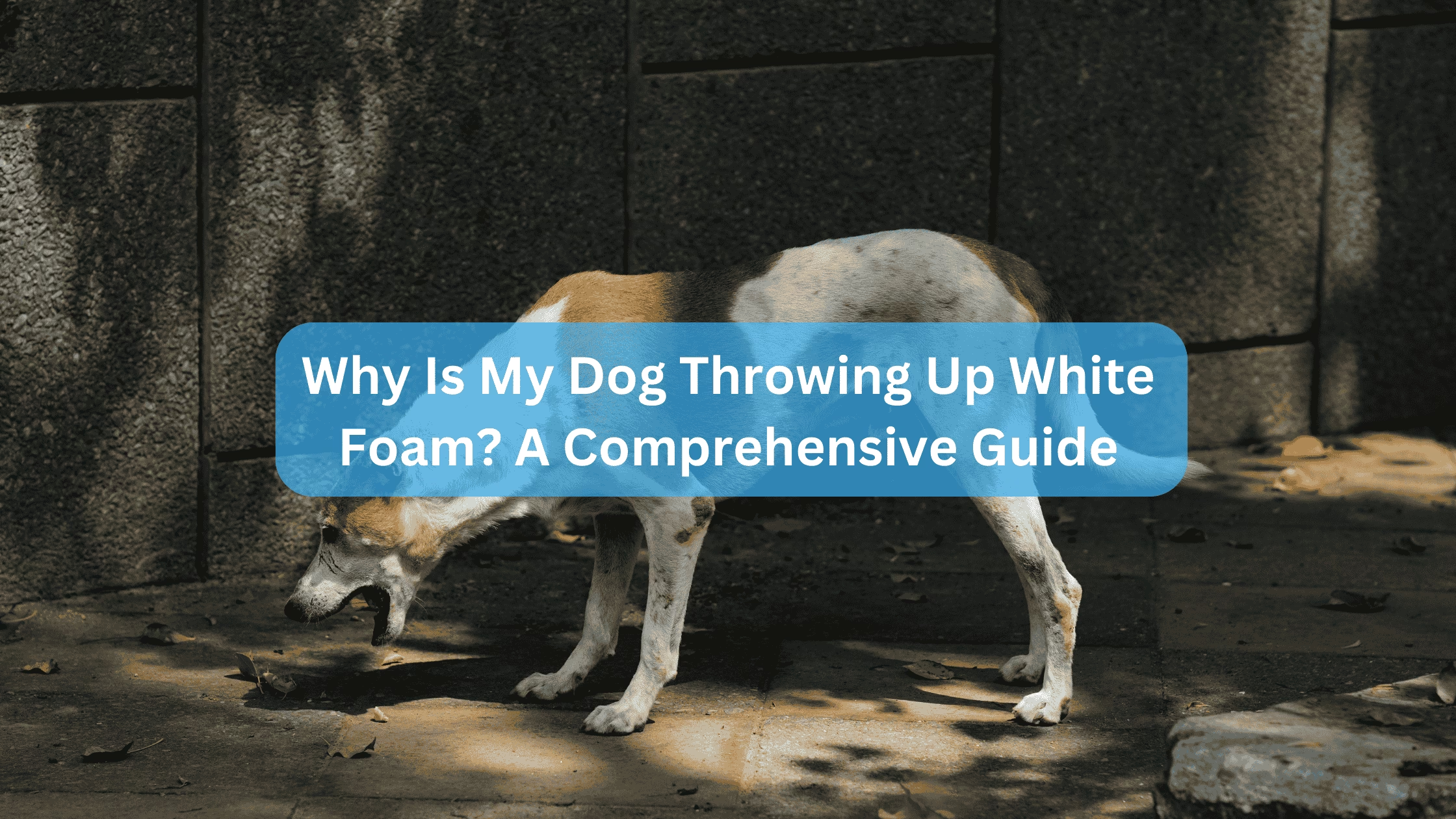Why Is My Dog Throwing Up White Foam? Seeing your dog throw up white foam can be alarming and distressing.
While occasional vomiting can be a normal occurrence in dogs, persistent vomiting of white foam may indicate an underlying health issue that requires attention.
This article will explore the potential causes, symptoms, treatment options, and preventive measures for dogs that vomit white foam.
Why Is My Dog Throwing Up White Foam?
When a dog vomits white foam, it typically indicates that their stomach is empty. The white foam is often a mixture of stomach acid and saliva. This can happen for several reasons:
- Empty Stomach: If a dog has not eaten for an extended period, the stomach may produce excess acid, leading to vomiting of white foam.
- Dietary Indiscretion: Eating something that doesn’t agree with them—like spoiled food or non-food items—can irritate the stomach lining and result in vomiting.
- Gastritis: Inflammation of the stomach lining can occur due to various factors, including allergies, infections, or ingestion of irritants.
Common Causes of White Foam Vomiting in Dogs
- Acid Reflux: When stomach acid flows back into the esophagus, it can cause irritation and lead to vomiting white foam.
- Gastritis: This condition involves inflammation of the stomach lining and can result from dietary indiscretion, stress, or infections.
- Pancreatitis: Inflammation of the pancreas can cause severe abdominal pain and vomiting. Dogs with pancreatitis often vomit white foam and may show signs of lethargy or decreased appetite.
- Bloat (Gastric Dilatation Volvulus): A life-threatening condition where the stomach fills with gas and twists on itself. Bloat can cause retching and vomiting of white foam and requires immediate veterinary care.
- Bilious Vomiting Syndrome: This occurs when bile irritates the stomach lining, typically in dogs that go too long without eating.
- Internal Blockage: If a dog ingests foreign objects (like toys or clothing), it can cause a blockage in the intestines, leading to vomiting.
- Infections: Viral infections like parvovirus or bacterial infections can cause gastrointestinal upset and vomiting.
- Intestinal Parasites: Worms such as roundworms or hookworms can irritate the digestive tract, leading to vomiting.
- Toxic Ingestion: Consuming toxic substances—such as certain plants or chemicals—can result in gastrointestinal distress and vomiting.
Symptoms Accompanying White Foam Vomiting in Dogs
While occasional vomiting may not be a cause for concern, you should monitor your dog for additional symptoms that could indicate a more serious problem:
- Persistent Vomiting: If your dog continues to vomit white foam repeatedly.
- Lethargy: A noticeable decrease in energy levels or enthusiasm.
- Loss of Appetite: Refusal to eat for more than 24 hours.
- Diarrhea: Particularly if it is bloody or watery.
- Signs of Pain: Whining, pacing, or sensitivity when touching their abdomen.
- Dehydration Signs: Such as dry gums, sunken eyes, or excessive panting.
When to Seek Veterinary Care If your dog is throwing up white foam
If your dog is throwing up white foam along with any of the following symptoms, you should seek veterinary care immediately:
- Persistent vomiting lasting more than a few hours
- Blood in vomit or feces
- Severe lethargy
- Signs of dehydration
- Abdominal pain or bloating
Early intervention is critical for conditions like bloat or parvovirus, which can be life-threatening if not treated promptly.
Diagnosis Options For Dog Throwing Up White Foam
When you take your dog to the veterinarian for vomiting white foam, they will likely perform several diagnostic tests:
- Physical Examination: The vet will assess your dog’s overall health and check for signs of dehydration or abdominal pain.
- Fecal Examination: A stool sample may be tested for parasites or bacterial infections.
- Blood Tests: These tests help evaluate organ function and detect underlying health issues.
- Imaging Studies: X-rays or ultrasounds may be performed to check for blockages or other abnormalities in the digestive tract.
Treatment Options For Dog Throwing Up White Foam
Treatment will depend on the underlying cause identified by your veterinarian:
- Dietary Changes: For mild cases like dietary indiscretion or gastritis, your vet may recommend a bland diet (e.g., boiled chicken and rice) after a period of fasting.
- Medications: Anti-nausea medications (like Cerenia) may be prescribed to help control vomiting. If parasites are present, dewormers will be administered.
- Intravenous Fluids: In cases of dehydration or severe illness, IV fluids may be necessary to restore hydration levels.
- Surgery: If there is an obstruction in the intestines (such as a foreign object), surgical intervention may be required.
Preventive Measures For Dog Throwing Up White Foam
To reduce the risk of your dog throwing up white foam in the future:
- Regular Feeding Schedule: Feed your dog smaller meals more frequently throughout the day to prevent an empty stomach.
- Monitor Diet: Avoid giving your dog table scraps or access to garbage that could upset their stomach.
- Keep Toxic Substances Away: Ensure that harmful plants and chemicals are out of reach of your pets.
- Routine Veterinary Check-ups: Regular visits to the vet can help catch potential health issues early on.
- Parasite Prevention: Use veterinarian-recommended preventatives for heartworms and intestinal parasites.
Also Read: Can Dogs Eat Egg Beaters? A Comprehensive Guide
Also Read: Can Dogs Eat Tomatillos? A Comprehensive Guide
Conclusion
If your dog is throwing up white foam, it’s essential to pay attention to their overall behavior and any accompanying symptoms.
While it can sometimes indicate minor issues like an upset stomach, persistent vomiting could signal more serious health conditions requiring veterinary intervention.
Always consult with your veterinarian if you have concerns about your dog’s health—early diagnosis and treatment can make all the difference in ensuring your furry friend stays happy and healthy!
Sources:







